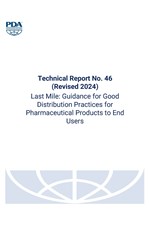Technical Report No. 46 (Revised 2024) Last Mile: Guidance for Good Distribution Practices for Pharmaceutical Products to End Users
Premium Members: to claim your annual free technical document download, email membership@pda.org and indicate the document you wish to claim.
- Format
- PDF Single User
- Member Price
- $180.00
- Nonmember Price
- $325.00
- Government Price
- $180.00
Please sign in or become a member to purchase items from the PDA bookstore.
PDA Technical Report No. 46 (Revised 2024): Last Mile: Guidance for Good Distribution Practices for Pharmaceutical Products to End Users complements the information provided in Technical Report No. 39 (Revised 2021): Guidance for Temperature-Controlled Medicinal Products — Maintaining the Quality of Temperature-Sensitive Medicinal Products through the Transportation Environment by going beyond manufacturer-focused issues and addressing issues specifically encountered within the last mile of the distribution of medicinal products and devices. This revision updates the original 2009 technical report to account for expanded regulations, the development and implementation of newer, more advanced technologies and supply chains that have become more extensive and complex.
Last mile distribution is an often-used logistical term that refers to the transport of products from the manufacturing facility to the end user. For the purposes of this technical report, last mile is defined as the final transfer of a drug from the manufacturer or wholesaler to the end user which could be either the patient or the entity (e.g., pharmacy, hospital) that provides the drug to the patient.
Transfers earlier in the distribution process involve organizations with greater knowledge of the product and the resources to ensure carefully controlled conditions of storage and transport compared to those available to the end user. As such, PDA Technical Report No. 46 provides recommendations and tools based on current best practices to ensure that product quality is maintained in the last mile, including guidance on temperature control, monitoring and security, and data management, with a focus on supply chain management. Additionally, it covers supply chains in Europe, Africa, Brazil, U.S., Canada and China.
Table of Contents
1.0. Introduction
2.0. Glossary and Abbreviations
3.0. Pharmaceutical Supply Chains
4.0. Pharmaceutical Products
5.0. Services and Temperature Controlled Systems
6.0. Data and Knowledge Management
7.0 Cost Management and Sustainability
8.0 Summary
9.0 References
About the Authors
Erik J. van Asselt, Ph.D., MSD (Co-Chair)
Rafik H. Bishara, Ph.D., Eli Lilly and Company (retired) (Co-Chair)
Riekert Bruinink, Former GDP Regulators
Giovanni Curotto, Epiqure
Fabian De Paoli, CCM28
Monika Derecque-Pois, GIRP
Ibnou Khadim Diaw, Africa Resource Centre Organization
Jean-Pierre Emond, The Illuminate Group
John Heller, Merck & Co., Inc.
Jeroen Janssens, GSK
Claude Jolicoeur, McKesson
Karl Kussow, FedEx
Zvonimir Majic, Technical Advisor
D. Mark Maurice, Sensitech
Janusz Mielewczyk, Amgen
Richard Peck, RP Pharma Consulting
Marcia Alves Preda, Nordika
Jennifer Richards, URAC
Anthony (TJ) Rizzo, Cold Chain Technologies
Lutz Schuette, Phoenix Group
Robert Seevers, Pearl Pathways
Eric Stener, Sanofi

